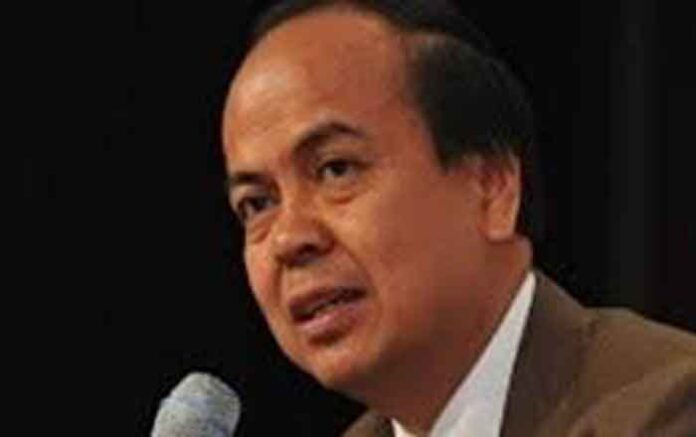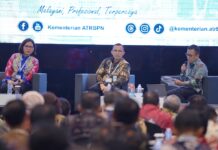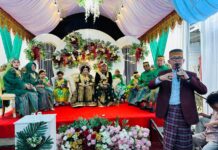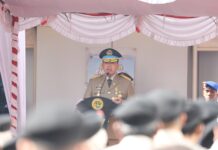Hafid Abbas
Commissioner/8th Chairperson of the Indonesian National Human Rights Commission (2012–2017)
At the commemoration of International Labor Day on May 1, 2025 at Monas, President Prabowo, speaking before hundreds of thousands of workers and Indonesian citizens, pledged that he would soon reclaim all state assets controlled by thieves, and ensure that those assets are returned to the people.
Prabowo stated: “And I will take back all state assets and return them to the people, my brothers and sisters, because I have consulted the Supreme Court justices. The constitutional basis is strong: the earth, water, and all natural resources contained within them are controlled by the state; sources of production that affect the livelihoods of the people are controlled by the state and must be used for the greatest prosperity of the people. That is the command of the Constitution.”
One of the state assets—about 1,000 hectares of state-owned land—is located in the elite coastal area of Makassar City, namely Tanjung Bunga. During President Soeharto’s era, this asset was planned to become a world-class marine tourism destination.
To realize President Soeharto’s vision, in early 1991 Tanri Abeng, Chair of the Indonesian Tourism Promotion Board (BPPI), established PT Makassar Development Corporation (MDC) following the suggestion of the Minister of Tourism, Post and Telecommunications, General Susilo Sudarman.
According to Tanri Abeng’s records, on May 14, 1991 he initiated the establishment of PT Gowa Makassar Tourism Development Corporation (GMTDC) with support from the South Sulawesi Provincial Government, Makassar City Government, and Gowa Regency Government. Abeng, as President Director, allocated shares as follows: 20% to the Province, 10% each to Gowa, Makassar, and the South Sulawesi Development Participation Foundation (YPPSS), and 50% to MDC as the entry point for foreign investors.
In the vision of Governor Amiruddin, Abeng, the regent, the mayor, and South Sulawesi leaders at the time, if an investor could transform Tanjung Bunga into a marine tourism destination like Liberty Island in New York or Cape Town in South Africa—visited by millions of foreign tourists annually—it could contribute trillions of rupiah in foreign exchange revenue each year and significantly enhance local welfare and development.
YPPSS joined based on its mission to contribute to development in South Sulawesi, especially by funding advanced studies for local youths through the Latimojong Education Foundation (YPL).
At the time, one key obstacle to developing marine tourism—an important cultural identity rooted in the long maritime history of the Bugis-Makassar people who dominated the seas with their phinisi ships long before Indonesia existed—was the absence of a five-star hotel in Makassar.
Therefore, on October 10, 1994, at Tanri Abeng’s invitation, James Riyadi wrote to the South Sulawesi Governor to join GMTDC. On January 1, 1995, the Governor appointed PT Metropolitan Permata Sulawesi (Lippo) to collaborate with GMTDC. As a result, the Sedona Hotel was built.
From that point on, most authority within GMTDC lay with the Lippo Group due to its experience, although Tanri Abeng remained President Director. Unfortunately, after more than three decades, GMTD—despite being a strategic state asset worth trillions of rupiah—has produced zero benefit for the regional governments and the people of South Sulawesi. As Makassar Mayor Danny Pomanto recently stated, the dividend for South Sulawesi in 2022 amounted to only Rp 58 million (detiksulsel, 09/01/2024).
Meanwhile, GMTD management appears increasingly distant from the original noble intentions of South Sulawesi’s government and community leaders, who envisioned Tanjung Bunga as a world-class marine tourism destination—not merely a site for shop houses, residential units, or a Horse Statue.
Another alleged irregularity is GMTD’s plan to sell assets, for example: 463,213 square meters of land in Tanjung Mardeka and Barombong, Tamalate District, Makassar City, valued at Rp 3.78 trillion. Such a plan should require approval from the South Sulawesi Provincial Parliament (DPRD), since the 1,000-hectare land in Tanjung Bunga originally belongs to the state (pasardana, 02/08/2025).
Another issue arises if shareholders in GMTD feel uncomfortable and consider selling their shares to Lippo or others under existing regulations. If such sales occur, they must be carefully examined: regardless of the size, the shares relate to the development of South Sulawesi and involve public interest. Selling shares to Lippo—already the majority shareholder—could raise governance concerns by further concentrating control over state-related land and regional interests.
Mismanagement of state assets (Articles 2 and 3 of the Anti-Corruption Law) that harms state finances could expose local governments to liability before the Corruption Court.
If any party intends to release its shares in GMTD, they should instead be returned to the South Sulawesi Provincial Government, Makassar City Government, or Gowa Regency Government, as this aligns better with legal and public policy principles and restores public ownership of the asset.
Local Government and Parliament Moving Forward Based on the existing facts about GMTD, the local government and DPRD could: (i). conduct audits and performance monitoring of GMTD, especially whether development in Tanjung Bunga aligns with the master plan for world-class marine tourism and the original commitments behind GMTD’s establishment; (ii) review cooperation agreements (if any) that GMTD has not fulfilled; (iii) if the land-use rights (HGB) have expired, promptly reclaim underutilized land for the state (local government), in line with President Prabowo’s expectations; (iv) halt any new development permits for GMTD if they do not benefit the local government and the people of South Sulawesi; (v) use internal oversight mechanisms (the inspectorate) to assess the social, economic, and environmental impact on local communities; and (vi) encourage DPRD to play an optimal role in safeguarding state assets within GMTD.
It may not be too late. Hopefully, going forward, the South Sulawesi Provincial Government, Makassar City Government, and Gowa Regency Government—along with their respective DPRDs—will never again allow regional assets to be managed by any party without providing optimal benefits for regional development and the welfare of the people of South Sulawesi, as envisioned by President Prabowo on International Labor Day.
“A nation’s greatness is measured by how it treats its weakest members.”
This reflects the principle that the majority must never dominate or exploit minorities—whether in business, governance, or social life (Mahatma Gandhi).
















